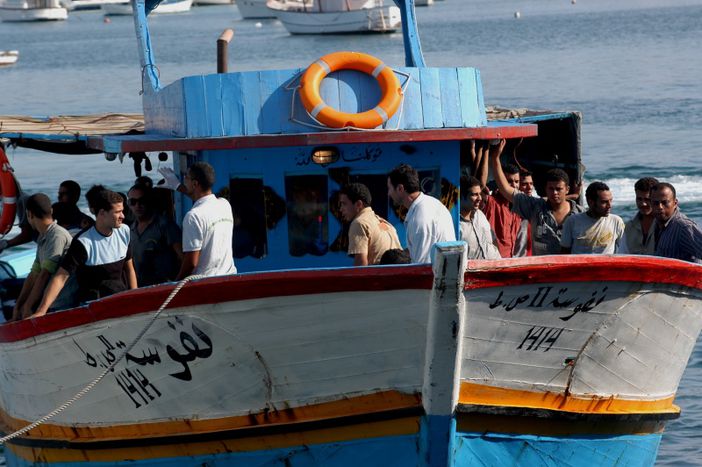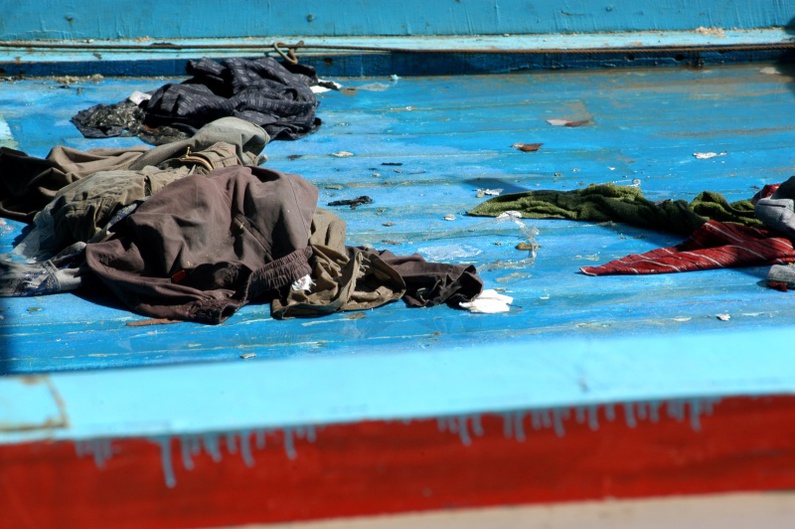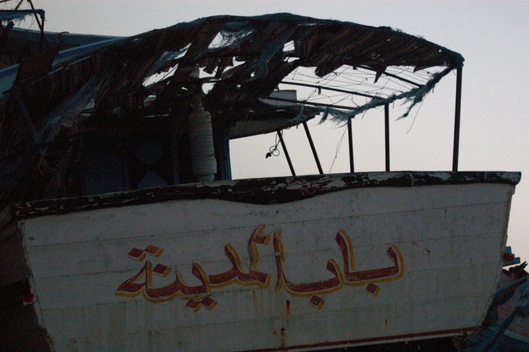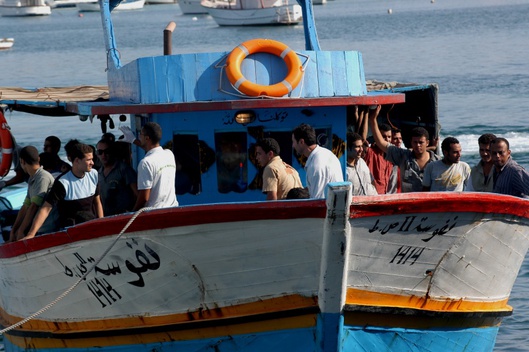
Lampedusa: sea of tradgedy, Island of loneliness
Published on
Translation by:
Natasha McBainIn the midst of a climate of helplessness and neglect, loneliness prevails on the island of Lampedusa. Facing an increasing influx of African immigrants, the locals have managed to organise themselves and create a system of ‘social wellbeing’ to attend to those who have recently arrived.
Neither the slowness of European institutions nor desperation can deter the brave islanders, who have brought into effect the Custom of the Sea.
Lampedusa, Italy, 2011. “The streets appear to be made of human beings rather than concrete. A ten year old boy calls at my door. I give him warm milk and biscuits. As the door closes behind him, I worry about where he will go. I suffer, thinking that my help is only temporary”. These are the words of Antonella Raffaele, a local on this afflicted island. She describes in a steady voice the situation that reached the Italian island in 2011, when only during the first three months of that year more than 18 000 immigrants, from the north of Africa, disembarked onto their coasts as a result of the Arab Spring.
For years, the tiny island of Lampedusa, situated in the Mediterranean Sea and closer to Africa than its own Italy, has been the chosen destination for waves of African immigrants who flee poverty, conflict or persecution. They travel in wooden boats which are often overcrowded and insufficiently equipped, liable to capsize in high seas. And with barely 5000 inhabitants, the island has become one of the main and most fragile ‘points of entry’ into Europe. Said waves have not subsided since 2011. However, it wasn’t until last October, when 360 immigrants drowned half a mile away from Lampedusa that the question about immigration really came to the fore in European debate.
 GIVING MEANING TO THE WORD 'SOLIDARITY'
GIVING MEANING TO THE WORD 'SOLIDARITY'
Having said that, for more than a decade the southern island has been witness to an extreme and fragile expression of civic solidarity. Locals in the area have improvised a system of ‘social wellbeing’ to tend to the increasingly large number of immigrants. After passing through the only existing immigration centre on the island designed to host around 300 people for a maximum of two days – a figure well below the number of that which has arrived in recent years – immigrants are left to their own devices on the streets of Lampedusa. Dirty, frightened, homesick, alone and confused, far from their country. It is at this moment when the islanders’ true solidarity begins.
 “Do you need a coat? A pair of shoes?” asks Grazia Raffaele from his window. Seeing crowds of immigrants pass by his house has become daily routine. “When the island has to confront major emergencies, human solidarity surrounds the village”. And with no more than their own resources, they make anything from food to clothing available to those who have recently arrived, as well as support which normally ends up turning into friendship. “We were usually making 600 sandwiches a day. We were also heating up milk or water to make hot tea”, explains Grazia. “It’s beautiful. We rallied together for a good cause. But later we felt as though we are incapable of helping because we give them a glass of milk and we think…what happens next?” Contributing from the beginning in any way possible, Antonio Raffaele highlights that “recently, the women have begun to knit woollen rugs because there is nothing left in their wardrobes. We have given out everything,” and he exclaims: “On a scale of one to ten, we offer a hundred!” For charitable organisations, this humanitarian aid has not passed by unnoticed. Tommaso della Longa, spokesperson for the Red Cross in Italy recognises that “the population has a central role in giving meaning to the word: solidarity. Absolutely. Help from locals always makes a difference, and is something that we should always be proud of”.
“Do you need a coat? A pair of shoes?” asks Grazia Raffaele from his window. Seeing crowds of immigrants pass by his house has become daily routine. “When the island has to confront major emergencies, human solidarity surrounds the village”. And with no more than their own resources, they make anything from food to clothing available to those who have recently arrived, as well as support which normally ends up turning into friendship. “We were usually making 600 sandwiches a day. We were also heating up milk or water to make hot tea”, explains Grazia. “It’s beautiful. We rallied together for a good cause. But later we felt as though we are incapable of helping because we give them a glass of milk and we think…what happens next?” Contributing from the beginning in any way possible, Antonio Raffaele highlights that “recently, the women have begun to knit woollen rugs because there is nothing left in their wardrobes. We have given out everything,” and he exclaims: “On a scale of one to ten, we offer a hundred!” For charitable organisations, this humanitarian aid has not passed by unnoticed. Tommaso della Longa, spokesperson for the Red Cross in Italy recognises that “the population has a central role in giving meaning to the word: solidarity. Absolutely. Help from locals always makes a difference, and is something that we should always be proud of”.
According to Grazia, when a family opens the door to their house, immigrants are able to take a shower or sit down on the sofa. “They call at the door with caution but within a short time they begin to feel at home. We share everything. There was even a moment when I realised that the members of my family had increased”. When the inhabitants of Lampedusa are asked whether they are tired of this distressing situation, their answer is unanimous: “we are not fed up, but we feel their pain”. “This is always how the citizens have expressed themselves about this difficult situation; they have never been against immigrants, but rather against the government. They feel abandoned”, confirms Della Longa.
europe and the custom of the sea
 Through a labyrinth of bureaucratic processes, the Italian government takes charge of tackling the issue of immigration, organising strategies and creating long-term projects - co-founded by the European Union – as Praesidium: an initiative set up to improve shelter on the island. These projects are the only medium that Lampedusa has to tackle these migratory flows. However, before any organisation manages to act on this; well before economic aid comes to the island, the people of Lampedusa, having always respected their old ‘Custom of the Sea’, are already there offering their immediate help.
Through a labyrinth of bureaucratic processes, the Italian government takes charge of tackling the issue of immigration, organising strategies and creating long-term projects - co-founded by the European Union – as Praesidium: an initiative set up to improve shelter on the island. These projects are the only medium that Lampedusa has to tackle these migratory flows. However, before any organisation manages to act on this; well before economic aid comes to the island, the people of Lampedusa, having always respected their old ‘Custom of the Sea’, are already there offering their immediate help.
In what could be characterised as a turning point in the history of Europe, an inevitable question arises: if the man on the street in Lampedusa can – with scant resources – demonstrate this unprecedented respect for human life and human rights, why does the EU not react to effectively save lives? It is likely that European institutions and national governments have to learn the lesson of this paradigmatic expression of solidarity, looking more closely at European borders and refocussing their approach with respect to immigration.
“Our children play football with theirs in the square. We meet in bars and offer them a cappuccino, although they never ask for anything. You have to look into their eyes to understand them”, concludes Antonella as she closes the door.
Translated from Lampedusa: mar de tragedia, isla de solidaridad



